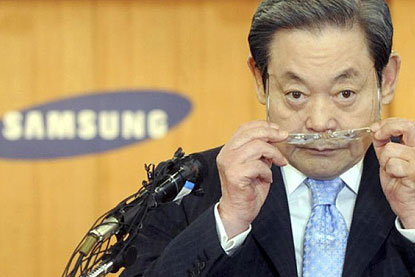 New Delhi, Apr 3: In fresh trouble for Samsung Electronics Chairman Lee Kun-hee, who is facing an arrest warrant, the Supreme Court has directed him to appear before a Ghaziabad court in a 1.4 million dollar cheating case filed against him.
New Delhi, Apr 3: In fresh trouble for Samsung Electronics Chairman Lee Kun-hee, who is facing an arrest warrant, the Supreme Court has directed him to appear before a Ghaziabad court in a 1.4 million dollar cheating case filed against him.
A bench of justices C K Prasad and P C Ghose, however, directed that the arrest warrant issued against 72-year-old Lee for his non-appearance in the case before the trial court will not be executed for a period of six weeks.
"However, the warrant of arrest issued against the petitioner (Lee) shall not be executed for a period of six weeks from today (March 31).
"In the meanwhile, the petitioner shall appear before the trial court in seisin(hearing) of the case and seek bail and/or exemption from appearance in accordance with law," the bench said.The court, however, made it clear that it was not expressing any opinion on the merit of the case pending before the trial court.
The bench passed the order on Monday on an appeal filed by Lee challenging the Allahabad High Court's order dismissing his plea for setting aside arrest warrant issued against him.
A complaint was filed by an Indian company, JCE Consultancy, against Lee in the Ghaziabad court for allegedly cheating it of 1.4 million dollar.
Lee had then approached the high court and the Supreme Court for quashing of FIR against him but his plea was rejected by both the courts earlier.
The trial court, thereafter, issued arrest warrant against him for not appearing before it in the case.





Comments
Add new comment